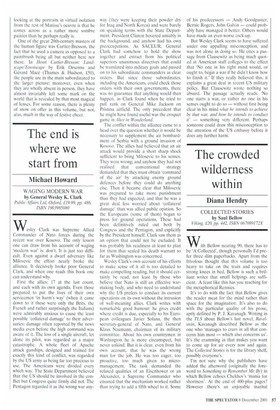The end is where we start from
Michael Howard
WAGING MODERN WAR by General Wesley K. Clark Public Affairs Ltd, Oxford, 119.99, pp. 486, ISBN 1903985080 Wesley Clark was Supreme Allied Commander of Nato forces during the recent war over Kosovo, The only lesson one can draw from his account of waging 'modern war' is: don't. It is just too difficult. Even against a dwarf adversary like Milosevic the effort nearly broke the alliance. It decisively broke poor General Clark, and when one reads this book one can understand why.
First the allies: 17 at the last count, and each with its own agenda. Even those prepared to put the lives of their own servicemen 'in harm's way' (when it came down to it these were only the Brits, the French and rather surprisingly the Italians) were admirably anxious to cause the least possible 'collateral damage' to their adversaries; damage often reported by the news media even before the high command was aware of it. The loss of a single aircraft, let alone its pilot, was regarded as a major catastrophe. A whole fleet of Apache attack gunships, designed and trained for exactly this kind of conflict, was regarded by the US army as being far too precious to use. The Americans were divided every which way. The State Department believed that the US should be involved in the conflict hut Congress quite firmly did not. The Pentagon regarded it as the wrong war any
way (they were keeping their powder dry for Iraq and North Korea) and were barely on speaking terms with the State Department. President Clinton hovered amiably in the background, and anyhow had his own preoccupations. As SACEUR, General Clark had somehow to hold the show together and extract from his political superiors unanimous directives that could be translated into military goals and passed on to his subordinate commanders as clear orders. But since those subordinates, including the Americans, could check those orders with their own governments, there was no guarantee that anything would then happen. as Clark found when he tried to pull rank on General Mike Jackson on Pristina airfield. The only precedent that he might have found useful was the croquet game in Alice in Wonderland.
The conflict within the alliance came to a head over the question whether it would be necessary to supplement the air bombardment of Serbia with a ground invasion of Kosovo. The allies had believed that an air attack would provide a short sharp shock sufficient to bring Milosevic to his senses. They were wrong; and anyhow they had not realised that conventional strategy demanded that they must obtain 'command of the air' by attacking enemy ground defences before they could do anything else. Then it became clear that Milosevic was prepared to take more punishment than they had expected, and that he was a great deal less worried about 'collateral damage' than was allied public opinion. So the Europeans (some of them) began to press for ground operations. These had been definitively ruled out both by Congress and the Pentagon, and explicitly by the President himself. Clark saw them as an option that could not be excluded. It was probably his readiness at least to plan for them that sealed his death warrant so far as Washington was concerned.
Wesley Clark's own account of his efforts to make sense of it all is too detailed to make compelling reading, but it should certainly be read, not least by those who believe that Nato is still an effective warmaking body, and who need to understand why the US prefers to conduct its current operations on its own without the intrusion of well-meaning allies. Clark writes with remarkable good humour: he gives credit where credit is due, especially to his European colleagues Javier Solana, the then secretary-general of Nato, and General Klaus Naumann, chairman of its military committee. About his own countrymen in Washington he is more circumspect, but never unkind. But it is clear, even from his own account, that he was the wrong man for the job. He was too eager, too proactive, too much given to micromanagement. The task demanded the relaxed qualities of an Eisenhower or an Alexander, a Supreme Commander who ensured that the mechanism worked rather than trying to add a fifth wheel to it. Some of his predecessors — Andy Goodpaster, Bernie Rogers, John Galvin — could probably have managed it better. Others would have made an even worse cock-up.
But Wesley Clark seems to have suffered under one appalling misconception, and was not alone in doing so. He cites a passage from Clausewitz as being much quoted at American staff colleges to the effect that 'No one in his right mind would, or ought to, begin a war if he didn't know how to finish it.' If they really believed this, it explains a great deal in recent US military policy. But Clausewitz wrote nothing so absurd. The passage actually reads: 'No one starts a war, or rather no one in his senses ought to do so — without first being clear in his mind what he intends to achieve by that war, and how he intends to conduct it' — something very different. Perhaps someone could draw this misconception to the attention of the US embassy before it does any further harm.






















































































 Previous page
Previous page